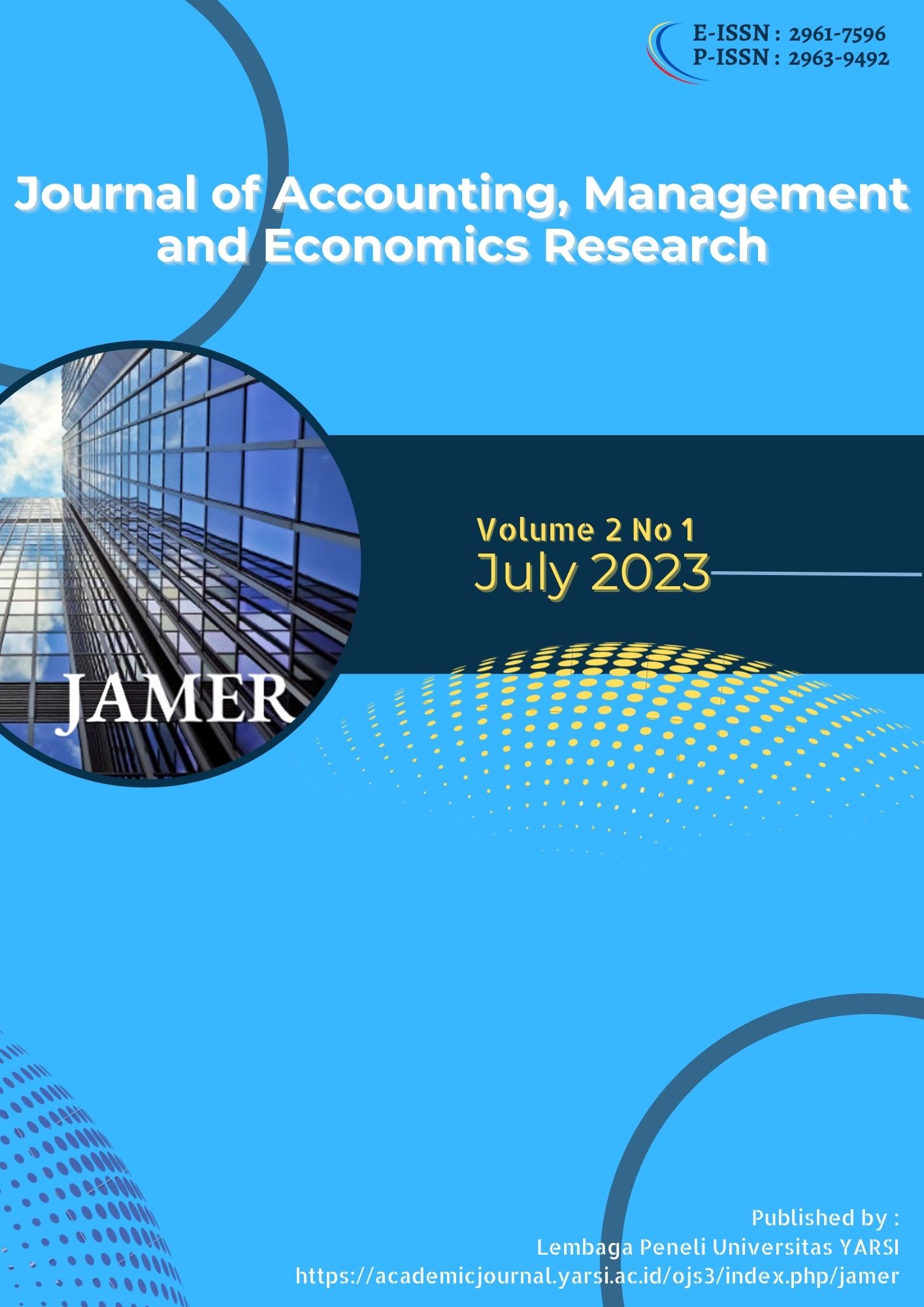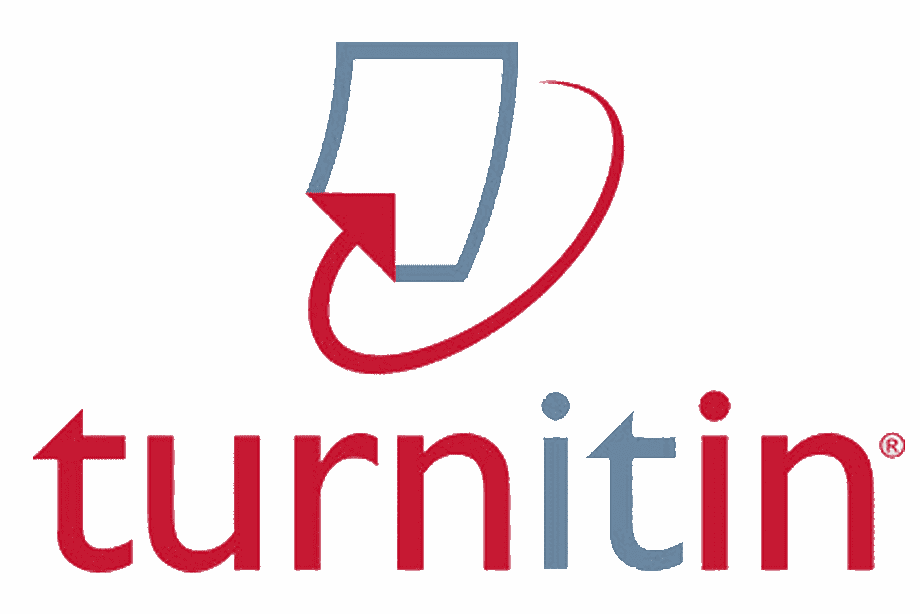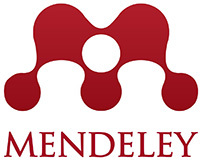The Effect of Corporate Social Responsibility, Free Cash Flow and Leverage on Earnings Management with Managerial Ownership as Moderating
Keywords:
Corporate Social Responsibility, Free Cash Flow, Leverage, Earnings Management, Managerial OwnershipAbstract
This study aims to determine the effect of corporate social responsibility, free cash flow and leverage on earnings management with managerial ownership as a moderator in consumer goods industrial companies listed on the Indonesia Stock Exchange (IDX) for the 2018-2021 period. This study uses quantitative research methods, which are measured by using multiple linear regression method with Eviews 12 software. The population in this study are consumer goods industrial companies listed on the Indonesia Stock Exchange from 2018 to 2021. Sampling using purposive sampling method with a total sample of as much as 23 companies with a research period of 4 years so that the total observations in this study were 92 observations. The data collection techn ique uses the documentation method through the IDX official website www.idx.co.id. The results of this study prove that (1) corporate social responsibility, free cash flow has a negative effect on earnings management, (2) leverage has no effect on earnings management, (3) managerial ownership is able to moderate the relationship of corporate social responsibility to earnings management, (4) ownership managerial is not able to moderate the relationship of free cash flow and leverage on earnings management.
References
Agustia, D. (2013). Pengaruh Faktor Good Corporate Governance, Free Cash Flow, dan Leverage Terhadap Manajemen Laba. Jurnal Akuntansi Dan Keuangan, 15(1), 27–42. https://doi.org/10.9744/jak.15.1.27-42
Ardiani, N. L. N., & Sudana, I. P. (2018). Pengaruh Corporate Social Responsibility Pada Manajemen Laba. E-Jurnal Akuntansi, 24(3), 2333–2359. https://doi.org/10.24843/eja.2018.v24.i03.p26
Budiantoro, H., Lapae, K., & Santosa, P. W. (2022). Pengaruh karakteristik komite audit, ukuran perusahaan, karakteristik dewan komisaris terhadap keberadaan komite manajemen risiko. Jurnal Riset Akuntansi Aksioma, 21(1), 19–28. https://doi.org/10.29303/aksioma.v21i1.153
Budiantoro, H., Nugroho, C. A., Santosa, P. W., & Lapae, K. (2022). The influence of financial targets, nature of industry, change of directors and CEO politicians on fraudulent financial statements. SIMAK: Jurnal Sistem Informasi, Manajemen, Dan Akuntansi, 20(1), 131–149. https://doi.org/https://doi.org/https://doi.org/10.35129/simak.v20i01.285
Dimarcia, N. L. F. R., & Krisnadewi, K. A. (2016). Pengaruh Diversifikasi Operasi, Leverage Dan Kepemilikan Manajerial Pada Manajemen Laba. E-Jurnal Akuntansi Universitas Udayana, 15(3).
Erianti, D. (2017). Pengaruh Free Cash Flow Terhadap Pertumbuhan Laba Perusahaan. BENEFIT Jurnal Manajemen dan Bisnis, 4(1). https://doi.org/10.23917/benefit.v4i1.7120
Fahmi, I. (2012). Analisis Laporan Keuangan. Jakarta: Alfabeta.
Gitman, L. ., & Zutter, C. . (2015). Principles of Managerial Finance. (14th Edition). USA: Pearson Education.
Herlambang, A. R. (2017). Pengaruh Free Cash Flow Dan Financial Leverage Terhadap Manajemen Laba Dengan Good Corporate Governance Sebagai Variabel Moderasi. SIMAK, 4(1), 118–134. https://doi.org/10.35129/simak.v18i02.149
Hermawan, S., & Hanun, N. R. (2018). Etika Bisnis Dan Profesi. Bandar Lampung: UMSIDA Press.
Jensen, M. C., & Meckling, W. H. M. (1976). Racial diversity and its asymmetry within and across hierarchical levels: The effects on financial performance. Journal of Financial Economics 3, 72(10), 305–360. https://doi.org/10.1177/0018726718812602
Kieso, W. and W. (2005). Intermediate Accounting (11th Edition). Willey.
Kodriyah, A. F. (2017). Pengaruh Free Cash Flow dan Leverage Terhadap Manajemen Laba Pada Perusahaan Manufaktur di BEI. Jurnal Akuntansi, 3(2), 64–76.
Lestari, E., & Murtanto, M. (2018). engaruh Efektivitas Dewan Komisaris Dan Komite Audit, Struktur Kepemilikan dan Kualitas Audit Terhadap Manajemen Laba. Media Riset Akuntansi, Auditing & Informasi, 17(2), 97–116. https://doi.org/10.25105/mraai.v17i2.2063
Mahadewi, A. A. I. S., & Krisnadewi, K. A. (2017). Pengaruh Kepemilikan Manajerial, Institusional Dan Proporsi Dewan Komisaris Independen Pada Manajemen Laba. E-Jurnal Akuntansi Universitas Udayana, 18(1), 443–470.
Mardiyanto, H. (2008). Intisari Manajemen Keuangan. Grasindo.
Marpaung, C., & Latrini, N. (2014). Pengaruh Dewan Komisaris Independen, Komite Audit, Kualitas Audit Dan Kepemilikan Manajerial Pada Perataan Laba. E-Jurnal Akuntansi, 7(2), 279–289.
Putriana, M., Artati, S., & Utami, V. J. (2018). Pengaruh Corporate Social Responsibility Terhadap Manajemen Laba Dengan Leverage Dan Growth Sebagai Variabel Control Pada Industri Farmasi Yang Terdaftar Di Bursa Efek Indonesia. J-MAS (Jurnal Manajemen Dan Sains), 3(2), 128–136. https://doi.org/10.33087/jmas.v3i2.60.
Ross, S. A., Jordan, B. D., & Westerfield, R. W. (2000). Fundamentals of Corporate Finance (5th Edition). Irwin McGraw-Hill.
Santosa, P. W., Rahayu, S. I., Simon, Z. Z., & Tambunan, M. E. (2021). The moderating role of audit quality and firm size in the effect of corporate governance on related party transactions: Evidence from Indonesia. Investment Management and Financial Innovations, 18(4), 166–176. https://doi.org/10.21511/imfi.18(4).2021.15
Sari, N. P., & Khafid, M. (2020). Peran Kepemilikan Manajerial dalam Memoderasi Pengaruh Profitabilitas, Leverage, Ukuran Perusahaan, Kebijakan Dividen Terhadap Manajemen Laba pada Perusahaan BUMN. Moneter - Jurnal Akuntansi Dan Keuangan, 7(2), 222–231. https://doi.org/10.31294/moneter.v7i2.8773
Setiadi, R. (2019). Pengaruh Leverage Dan Free Cash Flow Terhadap Manajemen Laba Dengan Mekanisme Corporate Governance Sebagai Variabel Moderasi. Journal Economics, 3(2), 34– 53. http://repository.wima.ac.id/21040/
Sitanggang, A. V., Mulyadi, A., Rizaldi, A., Ernawati, T., Pratikto, V. R. B., & Nofryanti. (2019). Analisis Pengaruh Free Cash Flow, Leverage Ratio Dan Ukuran Perusahaan Terhadap Manajemen Laba (Studi Empiris Pada Perusahaan Jasa Sektor Property, Real Estate Dan Konstruksi Bangunan Yang Terdaftar Di Bei Periode 2016-2018). Prosiding Webinar Nasional, 32–42. http://openjournal.unpam.ac.id/index.php/Proceedings/article/view/9913
Solikhah, I. (2022). Pengaruh Pengungkapan Corporate Social Responsibility (CSR) Terhadap Profitabilitas dan Manajemen Laba (Studi Empiris Pada Perusahaan Manufaktur Yang Terdaftar Di Bursa Efek Indonesia (BEI) Tahun 2015-2017. Jurnal Akuntansi AKUNESA, 10(2), 1–7. https://doi.org/10.26740/akunesa.v10n2.p94-106
Sugiyono. (2017). Metode Penelitian Manajemen. Bandung: Alfabeta.
Sugiyono. (2018). Metode Penelitian Kombinasi (Mixed Methods). Bandung: CV. Alfabeta.
Suryani, A., & Herianti, E. (2015). Pengaruh Pengungkapan Tanggung Jawab Sosial Perusahaan terhadap Koefisen Respon Laba dan Manajemen Laba (Studi Empiris pada Perusahaan Manufaktur yang Terdaftar di Bursa Efek Indonesia). Simposium Nasional Akuntansi XVIII. Medan, 1–26. https://doi.org/10.25105/jat.v1i1.4801
Triyana, T., Wiharno, H., & Nurfatimah, S. N. (2020). Pengaruh Pengungkapan Corporate Social Responsibility (Csr), Free Cash Flow, Dan Leverage Terhadap Manajemen Laba. Jurnal Ekonomi Akuntansi Dan Manajemen, 1(1), 1–11. https://doi.org/10.1088/1751- 8113/44/8/085201
White, G. I., Sondhi, A. C., & D., F. (2003). Cash Flow Analysis. In The Engineer’s Cost Handbook. John Wiley & Sons, Inc. https://doi.org/10.1201/9780203910016.ch8
Zulkarnain, R., & Helmayunita, N. (2021). Pengaruh Corporate Social Responsibility, Mekanisme GCG terhadap Manajemen Laba: Pada Perusahan Manufaktur yang Terdaftar di Bursa Efek Indonesia. Jurnal Eksplorasi Akuntansi, 3(3), 547–566. https://doi.org/10.24036/jea.v3i3.423
Downloads
Published
How to Cite
Issue
Section
License
Copyright (c) 2023 Aisiyah Pangesti, Flourien Nurul Chusnah

This work is licensed under a Creative Commons Attribution-ShareAlike 4.0 International License.

This work is licensed under a CC Attribution-ShareAlike 4.0 International License

 Aisiyah Pangesti
Aisiyah Pangesti
 Sekolah Tinggi Ekonomi Indonesia Jakarta
Sekolah Tinggi Ekonomi Indonesia Jakarta







